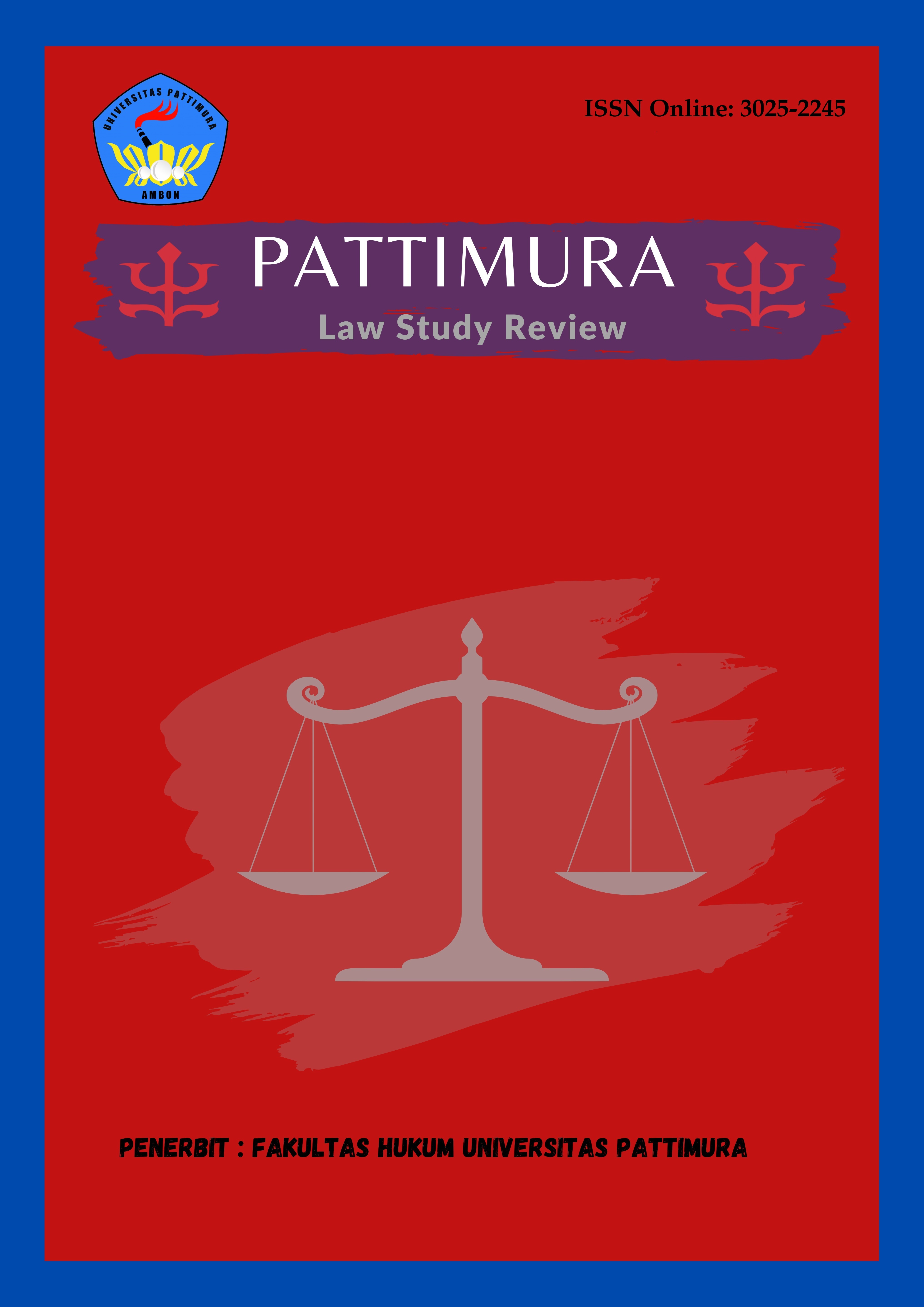Perlindungan Satwa Langka Berdasarkan Asean Aggrement On The Conservation of Nature and Nature Resources 1985
Abstract
The 1985 ASEAN Agreement on the Conservation of Nature and Nature Resources states that ASEAN member states have responsibilities for wildlife in terms of protecting endangered species, conserving endemic species and implementing policies under their authority to prevent the extinction of species and subspecies. Article 5 of the agreement regulates endangered and endemic species, which states must register endangered species and take special measures. In relation to endangered wildlife, member states are responsible for prohibiting the hunting of such species; regulating the trade and possession and products of such species; protecting the habitats of such species; taking necessary policies to improve their conservation status and restore their populations to the highest level. This type of research is normative juridical where the research is carried out by collecting primary, secondary and tertiary data obtained using literature studies. The data that has been collected is analyzed qualitatively in which the description is arranged systematically based on legal disciplines to achieve clarity of the problems to be discussed. The results of this study show that animal protection is regulated in Article 3 of the ASEAN Agreement on the Conservation of Nature and Natural Resources: “The Contracting Parties shall, wherever possible, maintain maximum genetic diversity by taking action aimed at ensuring the survival and promoting the conservation of all species under their jurisdiction and control”.
Downloads
References
Buku
AK. Syahmin, 1988., Masalah‐ Masalah Aktual Hukum Organisasi Internasional, Bandung: Penerbit CV. ARMICO
Angela Pennisi di Floristella, 2015, The ASEAN Regional Security Partnership: Strengths and Limits of a Cooperative System, United Kingdom: Palgrave Macmillan
Arief Amrullah, 2004, Tindak Pidana Pencucian Uang Money Laundering, Bayumedia Publishing, Malang,
Baher Johan Nasution, 2008, Metode Penelitian Ilmu Hukum, C.V. Mandar Maju, Bandung,
Bambang Cipto, 2007, Hubungan internasional di Asia Tenggara: teropong terhadap dinamika, realitas, dan masa depan,Yogyakarta : Pustaka Pelajar,
D. W. Bowett, 1992, Hukum Organisasi Internasional, Jakarta : Sinar Grafika
Dimas Aditya Wicaksono, 2016, Upaya Pemberantasan Perdagangan Hewan Ilegal di Indonesia Melalui Kerangka ASEAN Wildlife Enforcement Network (ASEANWEN), Makassar:Universitas Hasanuddin,
Jurnal
Andi Purnawati. Perlindungan Hukum Terhadap Satwa Langka Dalam Sisitim Hukum Pidana Indonesia. Maleo Law Journal. Vol 3 No 2. 2019.
Arif Firmansyah Herliyanto, Sanksi Pidana Terkait Perdagangan Satwa Liar yang Dilindungi, Juristdiction, Vol 2, No 3, 2019,
Ayu Ma’rifah, Budi Parmono, Rahmatul Hidayati, “Penanganan Kejahatan Lintas Negara Melalui Perjanjian Ekstradisi”, Jurnal Ilmiah Ilmu Hukum Volume 27 No. 8, 2021
Dewi, I. G. A. P. S. Lembaga Konservasi Satwa Dalam Perspektif Perdagangan Satwa Ilegal1." Jurnal Magister Hukum Udayana Vol 5. No 2 2016.
Elfia Farida, “Efektivitas Piagam ASEAN (ASEAN Charter) bagi ASEAN sebagai Organisasi Internasional”, Jurnal QISTIE, Vol. 3 No. 3, Fakultas Hukum Universitas Wahid Hasyim, 2009,
Finckenauer, Hoffman. & Nelson, Voronin. 2001. ‘Body Packing: The Internal Concealment of Illicit Drugs’, New England Journal of Medicine, vol. 349, no. 26, pp. 2519- 2526. Lihat juga Williams, P. 1997. ‘Russian organized crime: the new threat?’ (Frank Cass, London)
Firdaus, Muhammad Reza, And Dian Alan Setiawan. "Perlindungan Hukum Terhadap Satwa Langka Indonesia Berdasarkan Undang Undang No 5 Tahun 1990 Tentang Konservasi Sumberdaya Alam Hayati Dan Ekosistemnya." Bandung Conference Series: Law Studies. Vol. 2. No. 2. 2022.
Gunawan Widjaja, “Aspek Hukum Dalam Kontrak Dagang Internasional : Analisis Yuridis terhadap Kontrak Jual Beli Internasional” , Jurnal Hukum bisnis, Vol. 27 No. 4 (Tahun 2008),
Harahap, Noprita Ulfah. Kebijakan Luar Negeri Indonesia Dalam Program Repatriasi Satwa Langka Dengan Negara-Negara Asean, 2015-2020. 2022.
Karundeng, Christian O., Dringhuzen J. Mamahit, and Brave A. Sugiarso. "Rancang Bangun Aplikasi Pengenalan Satwa Langka di Indonesia Menggunakan Augmented Reality." Jurnal Teknik Informatika Vol 13. No 1 2018.
Natalia Yeti Puspita, “Kewenangan Hukum Asean Dalam Membuat Perjanjian Internasional Dengan Pihak Eksternal Berdasarkan Piagam ASEAN”, Vol. 4 No. 3, Fakultas Hukum Universitas Katolik Indonesia Atma Jaya, 2015.
Netty Songtiar Rismauly Naiborhu, tanggung jawab negara terhadap perdagangan satwa liar dan keanekaragaman hayati melalui kerjasama negara-negara asean state responsibility towards wildlife trade and biodiversity through the cooperation of asean countries, Bina Hukum Ligkungan Volume 5, Nomor 2, Februari 2021
Windy Vidya Pratitya, “Analisis Terhadap Upaya Penegakan Hukum Perdagangan Ilegal Satwa Yang Dilindungi ( tudi Kasus: Perdagangan Ilegal Burung Kakatua Kecil Jambul Kuning)”, skripsi, Fakultas Hukum Universitas Indonesia, Januari 2016,
Zakariya, Rizki. Penguatan Kerja Sama Lintas Negara dalam Penegakan Hukum Perdagangan Satwa Liar." Jurnal Hukum Lex Generalis Vol 2 No 11. 2021.
Web
ASEAN-WEN,2006, The ASEAN Wildlife Enforcement Network (ASEANWEN), yang diakses melalui http://environment.asean.org/the-asean-wildlifeenforcement-network-asean-wen/
CITES diakses dari http://id.wikipedia.org/wiki/CITEs
http://www.beritasatu.com/kesra/345236-asean-buat-perangkathukum-tindak-pidana-satwa--liar.html,
Copyright (c) 2025 Clif Kainama, Irma Halima Hanafi, Dyah Ridhul Airin Daties (Author)

This work is licensed under a Creative Commons Attribution-NonCommercial 4.0 International License.
Authors who publish their manuscripts in this Journal agree to the following conditions:
- The copyright in each article belongs to the author, as well as the right to patent.
- Authors are able to enter into separate, additional contractual arrangements for the non-exclusive distribution of the journal's published version of the work (e.g., post it to an institutional repository or publish it in a book), with an acknowledgment of its initial publication in this journal.
- Authors are permitted and encouraged to post their work online (e.g., in institutional repositories or on their website) prior to and during the submission process, as it can lead to productive exchanges, as well as earlier and greater citation of published work.
- Authors have the right to self-archiving of the article (Author Self-Archiving Policy)













